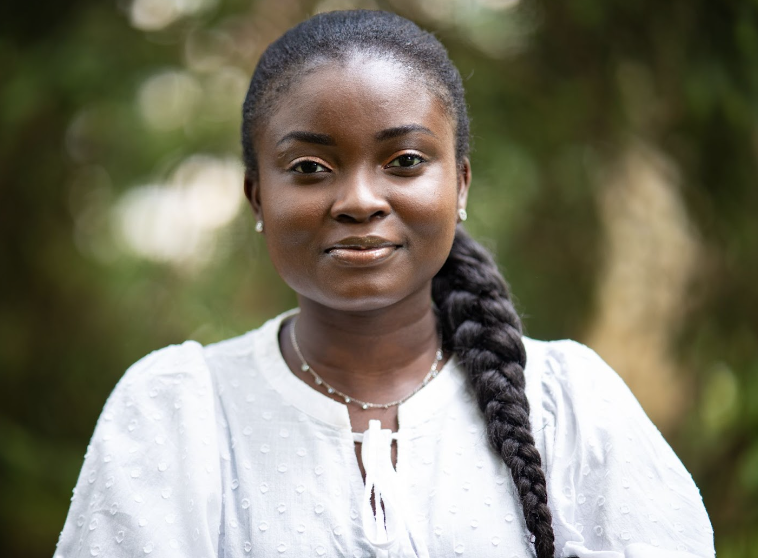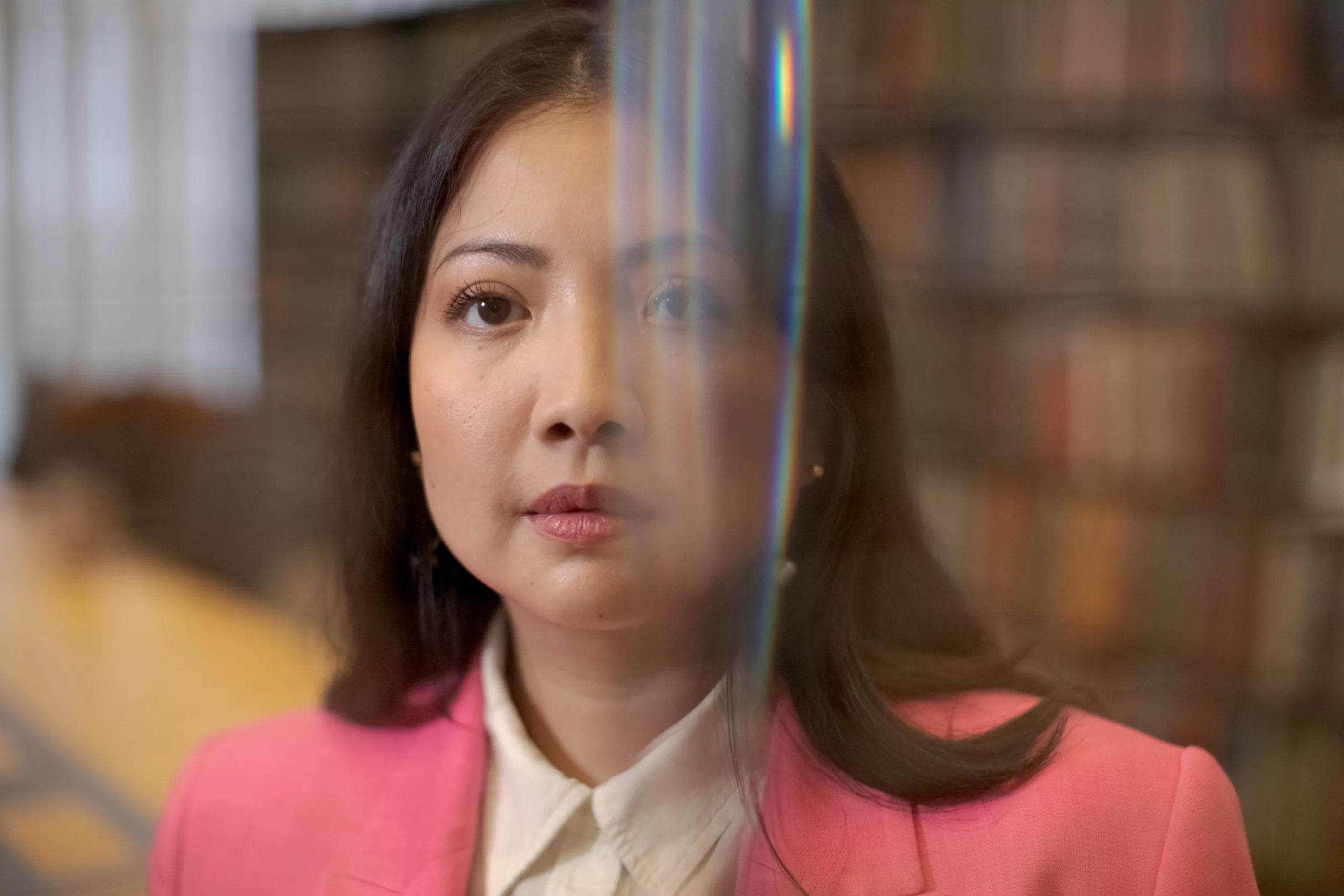As part of Documented’s new “Our City” interview series, we are speaking to prominent and influential New Yorkers who have deep connections to New York’s immigrant communities, some of whom are immigrants themselves. We ask them about how they made New York City their own, where they feel most connected to in the city, current projects, and more.
WHEN KRISTIN VILLANUEVA and I first meet, I notice she’s wearing the same wedding ring that she wore in “The Courtroom.” I feel almost transported from watching the film to having our interview.
“That’s so funny you noticed,” Villanueva, 39, says. She’s currently wearing an unmistakable gold ring with a turquoise blue-green rectangle cut gemstone and a pink sweater. “Our costume designer saw me wearing it — it’s my engagement-wedding ring, and she’s like, Do you mind wearing that on the other hand? I was like, No, sure.”
Villanueva plays Elizabeth in “The Courtroom,” a film based on the true life story of Elizabeth Keathley, a Filipina who moves to the United States, gets married and starts a family. However, she makes a seemingly minor error while filling out an application form for an Illinois state I.D. card at the DMV. The mistake leads her into a harrowing ordeal: deportation proceedings.
In one scene, Villanueva breaks into tears, and I couldn’t stop myself from tearing up. “Succession” star Arian Moayed and two-time Obie Award-winning director Lee Sunday Evans received permission from the Keathley family and immigration lawyer Richard Hanus to use the transcripts of Elizabeth Keathley’s court case as a script. Everything spoken by the characters is taken directly from the actual court transcripts.
Also Read: Julio Torres Wants Us to Laugh at the Immigration System
And while Villanueva plays an immigrant in “The Courtroom,” she too has her own immigration story. In 2001, Villanueva did not know she was immigrating to the U.S. from the Philippines until three months before her flight. Only 16 years old at the time, she fought against her mother’s decision to send her away from the Philippines to stay with her aunty in Virginia, but, to no avail.
Today she’s acted in comedy and drama series such as “Gossip Girl,” “Bonding,” “Search Party,” and Mike Donahue’s “Troy,” a funny short film that depicts a New York City couple and their very sexually active neighbor, amongst others.
Despite her ability to make viewers empathize with her characters, which she partly credits to her physical appearance (she has round cheeks and she is 5 foot 1 inch), she’s looking to play an evil or manipulative character in a future play or film.
“What I’m rarely cast as is somebody batshit,” Villanueva says. “Some of my favorite shows are ‘The Wire,’ and ‘Narcos.’ Those are pretty gritty evil shows because of all the drugs and murder and stuff. I would never be cast in them. Look at me, I’m wearing pink.”
In the scene of “The Courtroom” film, where everyone in the courtroom was waiting for the judge’s verdict, you were lost in thought. What was going through your mind?
What my character Elizabeth would do if the verdict is a “No.” The guilt and embarrassment of moving back home. Of being not just a nuisance, but imagining my mother and father just got rid of me and now I’m coming back with a child and with a foreigner. Where would we live? How would he get a job? What kind of job? What am I going to do? What room will we live in, in my father’s house? The logistics of it.
At the same time, telling myself: You’re fine. You are fine. You’ll be fine. You have a good lawyer, we’ll be fine. You made your point, this can’t be happening. It will end here.
“The Courtroom” was a show first off Broadway. When we did about 15 or 20 shows, it was very difficult because I was processing my role as it was happening through the lens of the character. It wasn’t until we started doing the movie where I think I had a better control of me going through those emotions as a person, versus the person I’m portraying.
What exactly made you feel like you were drowning in emotions initially?
Things like having English not as your first language. That fear, that insecurity, came up like a flood because the character’s accent is different from mine. Hers was very thick. All I could think about at the time unconsciously, was my mother, was my aunt. Like, My god, what do they feel? They still have a very heavy accent, and they’ve been living here for a while; what is that like, to not be understood and to not be able to have the words at the moment you want them to explain yourself at very, very crucial moments, like when a person is being deported? That was one of the drowning moments.
The guilt and the shame of thinking that you will have to be deported back. For me, that guilt and shame of “Kristin went to the States to have a better life. Yet, she chose to be an actor, out-of-work after.” The shame of not coming back to the Philippines as a success. I was just like, What are these? What did I sign up for? It was like Pandora’s box just opened.
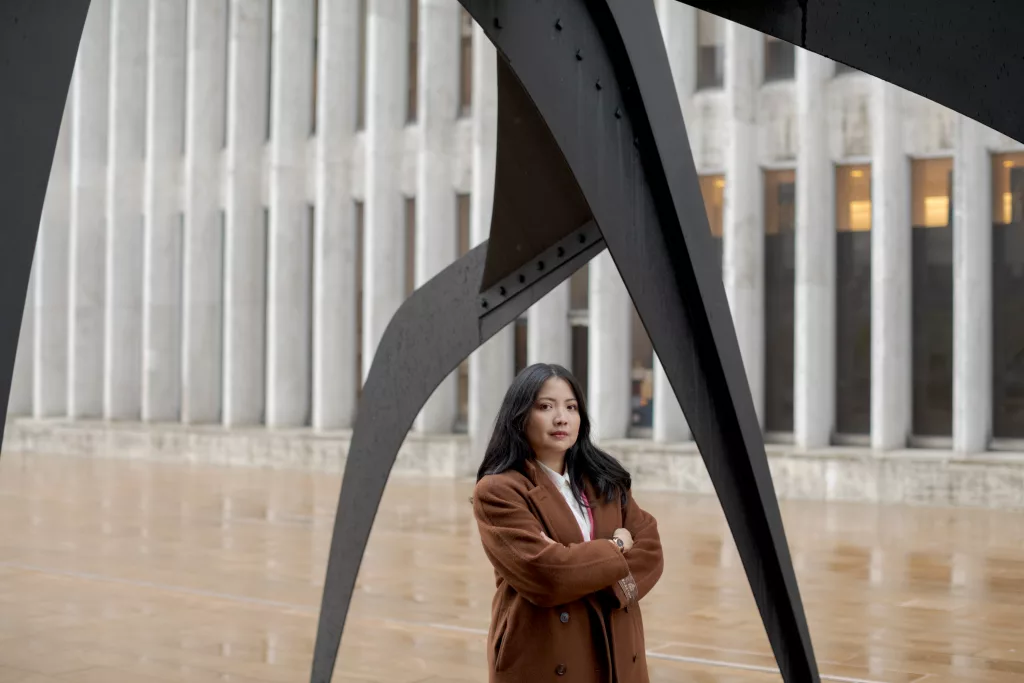
Thanks a lot for sharing that. When you moved to the U.S. from Manila at age 16 to D.C., what made you move? How were your first couple of years?
When I was 13, we got a random call from my father, who has been out of my life since I was 11 months old, which was when he moved to the States. He tried to keep the relationship going with my mother, but eventually it fizzled out. So at age 13, we got a random call from him, telling my mom that he is now an American citizen, and “if you would like me to petition for Kristin to get her green card, I can do that.” That’s like winning the lottery if you’re Filipino.
“What is that like, to not be understood and to not be able to have the words at the moment you want them to explain yourself at very, very crucial moments.”
All of these were not discussed with me because I was 13. It wasn’t until I was 16 when it became a reality, my mother asked if I would like to spend my summer vacation with my aunty in Virginia before my senior year in high school. I had never been to the U.S., so I said, of course, a resounding yes. It wasn’t until three months before my flight that they sat me down to say, Okay, we’ll enroll you at Bishop O’Connell. Blah blah blah.
I’m like “Enroll? What are you talking about?” And they were like, “To finish high school in Virginia.” I rebelled. I cried. This was just supposed to be a summer vacation but all along they’ve been planning for me to move here to live with my mom’s sister. So, not with my dad. My dad was just the paperwork. I barely knew my mom’s sister because she would only visit the Philippines once a year.
It was absolutely chaotic and traumatic, but presented to me as: This is a lottery. You get a green card. Many people uproot their lives just to get a green card, right? I didn’t have any choice. I arrived in May of 2001.
Looking back, hindsight is always 2020 right, I thrived because I made friends easily. I thrived in high school, and that’s where I discovered acting. But the only way I could cope, leaving home, is by forgetting home.
That must have been hard. When you say “by forgetting home,” what exactly does that mean?
I didn’t go home until seven years later. I think part of it is also that I didn’t have any money. I was still a high school student, and I was too embarrassed to ask for it because I already knew my aunt took me in. I think they definitely would have given me money to go home. But emotionally, I probably avoided it without knowing that was what I was doing. It was kind of like, this is what you send me out to do? Then, fine. I will set out to do it, and just keep moving forward.
How did that relationship with your parents and your family play over time? Were there hiccups over the years?
Now that I’m seeing a therapist more often, so many things are coming up that are unresolved because of that point in time. It’s not so much as hiccups as like disagreements between us, but more so about the realization of how different I am from them. It’s very sad because we’re so different.
Hiccup in a sense too that my mother eventually moved to the States, so she’s living with that same aunt I lived with and both of them are talking more and more about retirement. What would make the most sense for them is to retire in the Philippines. Financially, they would live a better life there just because of the U.S. dollars they’ve made.
I could see my aunt who’s been living here since the ’70s in a purgatory mode of, wow, she will have to leave the home she’s known since the ’70s and yet again figure out how to be a Filipino again, living in Manila. I’m thinking, Oh my gosh, we live the American dream of moving to the States and there’s no guarantee that we’ll stay there till our death. How do you cope with that? What does that mean for me? Because then I’ll be my only blood here. I mean, I have my husband, but he’s not Filipino. Then I’ll be alone when they retire in the Philippines. So that’s the kind of hiccup that I think is coming up now through therapy.
Let’s talk about living in New York City. You’ve lived in the U.S. longer than you ever lived in Manila. When you think about yourself now, do you see yourself as a Filipino immigrant first, or an American, or a New Yorker?
I’ve definitely never said ‘Filipino American,’ which is interesting. That’s probably because — and this is just my humble opinion — I feel like Filipino American is reserved for first, second, third generation. I am a zero generation. I’m an immigrant. I was not born here. So I think I would say Filipino immigrant and New Yorker.
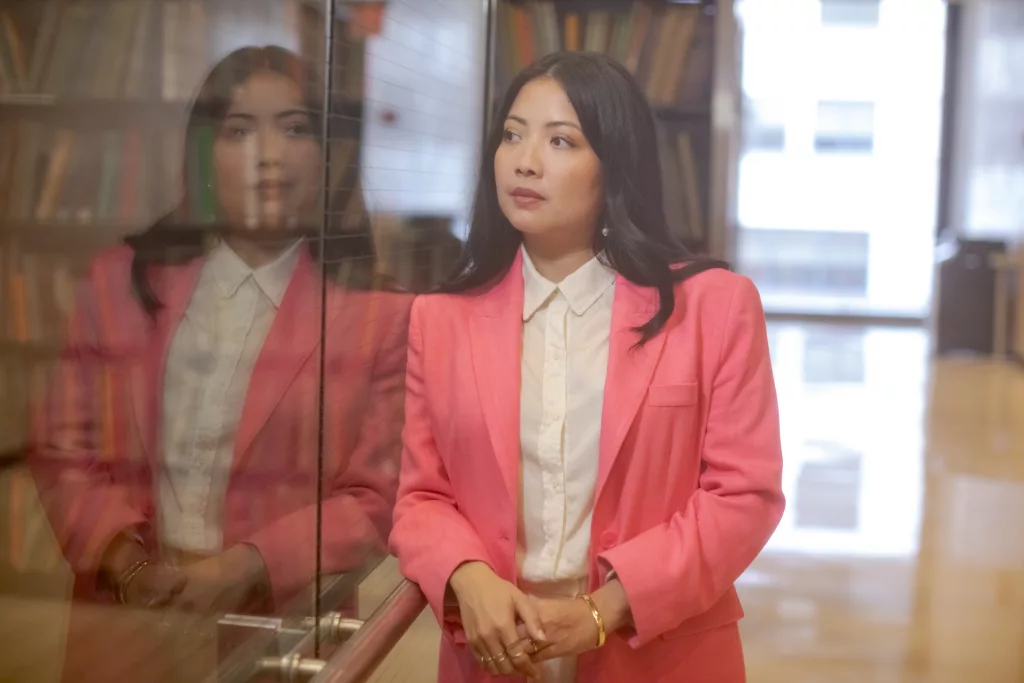
What would you say is the hardest part of being an immigrant actor in NYC?
This is more like a complaint. I think in New York, specifically the directors casting, the decision makers who have power to bring in people to audition or to hire people, are always going to the same people. They get comfortable like, oh, we know this person already. I am very happy, though, that for a while I was very concerned about my accent but I feel nowadays more and more shows are celebrating that.
What’s the weirdest story or thing that’s happened to you either on the subway, street, at a restaurant or something?
My favorite subway experience was around 2008, 2011. It was Halloween. I had been a waiter for eight years and had come to dislike crazy holidays or events. A. Because I’m jealous I don’t get to participate because I’m working. B. It is overhyped. C. I have to clean up people’s puke, whatever.
But this particular Halloween, my roommate was working, she was a bartender at a club. So she’s like “Come, I will give you drinks for free.” I did not dress up. So I’m just wearing normal clothes. Of course, I am surrounded by people in costumes. Somebody was dressed up as a Barbie in a box; that was very cute.
When I took the subway home, we got stuck. The train wasn’t moving. Five minutes went by, seven minutes went by, then the fifteenth minute, somebody from the other car train walked through our train to the other side. And it was Batman. He was walking as if he was going to save the day and make the train move. He did it so confidently and slowly that all of us on the train — sober and drunk people — were just staring at him, following him with our eyes. Then he exited and went to the other car of the train, and then we all just started laughing and clapping.
It’s 3 o’clock in the morning. We want to go home. We’re tired. We’re drunk. And then, Batman. I feel like that’s only in New York kind of thing.
Is there anywhere in the city you feel most connected to?
The subway. Every time. Good or bad, you’re just in there. You’re in it. You are together. If there’s a weird thing happening, you are connected with the rest of the group. If there’s a dangerous thing happening, you are connected with the rest. If you’re laughing at Batman, you are connected. You can also see different people in terms of race, in terms of where they’re from, in terms of being in the one percent versus those earning hourly wages. It’s right there in front of you. I don’t know where else you can see that.
“We live the American dream of moving to the States and there’s no guarantee that we’ll stay there till our death. How do you cope with that? What does that mean for me?”
Since moving to New York, what has been interesting to you about the way people interpret you and your work?
Two quotes from my very dear friend that I absolutely love. Back when I was looking for a waiting table job, a lot of people were telling me ‘just lie about your experience.’ I didn’t have a lot of experience. But I was so afraid to lie. So I’m telling one of my best friends Angie, she’s not an actor, but she was my roommate in college, “Everyone’s telling me to lie.” And then when I say I can’t lie, they all say, “You’re an actor, it should be easy.” And I’m like, “It’s not.” And she goes, “That’s what makes you a good actor, you don’t lie.” I really liked that.
The second quote is from my other very good friend, who is an actor and went to school with me. We were always team partners. I was reading a book, “How to Choose the Perfect Monologue for You.” According to the book, when it comes to comedic monologues, you have to ask yourself and truthfully answer: Are you someone that people laugh at or people laugh with?
So I asked my team partner who is always acting with me, which one am I? And then he goes: “On stage, you can be a people laugh with you. In life, people laugh at you.”
That’s funny and blunt.
It’s not true anymore. You’ve seen my shows. You’ve seen my episodes. I feel like looking back, most of the comedic roles I play are laugh at.
Yeah I agree. It was so with “Search Party” and “Bonding.” I don’t think it was so with your character in “Troy” though.
No, she’s a ‘laugh with.’
Do you think this has changed in your real life too?
I think so. I think I’ve been more of a ‘laugh with.’ I should ask my husband. I think I’ve gotten funnier in real life.
What do you think changed?
I think just not being as shy as I used to be, with English not being my first language. So I’m like, I’m not even going to think about what comes out of my mouth anymore. Then onstage, I think just the freedom of, I don’t care if I’m a laugh at. Also, I think being a laugh at is a lot harder on stage or in film because people have to truly believe that you are just so dumb and stupid to be a laugh at. You have to think about that as the actor, to do very ‘laugh at’ stupid shit.
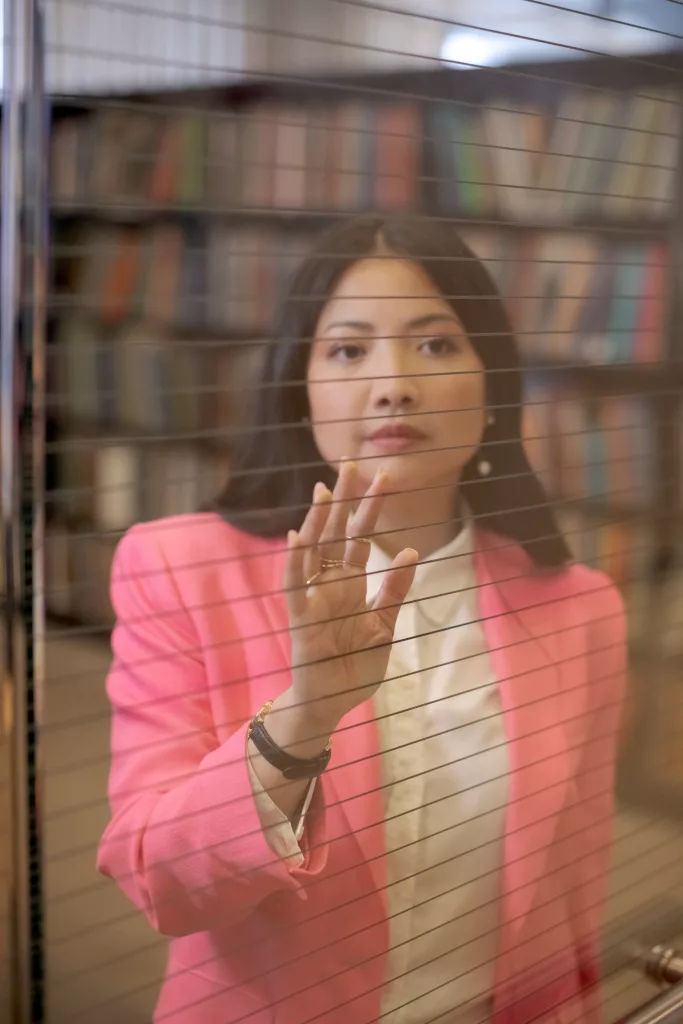
Many of the films you’ve acted in are comedy. Were these conscious decisions you made?
Absolutely not. I am desperate to be hired. But in all seriousness, I absolutely would want to do both comedy and drama. I always think there is no comedy. It’s all drama. It’s all tragic. Because we’re all going to die. It’s just the intensity that people do it in.
One of the characteristics of the roles I am frequently cast as, these days, are very neurotic. Like a worrier. Like assistants. In real life, I have been an executive assistant a couple of times. It depends on your boss or how high-stressed the job is, you really do get neurotic like that. And when you see someone like that, it’s hilarious. Like [Andrea Sachs in] “Devil Wears Prada. It’s hilarious. But you cannot play that part hilarious. You cannot. So I don’t think of that as comedy. What I can do as an actor is just really, really play it as seriously as I can. Because my life depends on it. If I lose this job, that will be the end of me.
What’s a role that you’ve always wanted to perform, but hasn’t quite happened yet?
I’ve never been on a “Law & Order” episode, and the joke in the New York acting community is that you’re not a real New York actor until you’ve been on “Law & Order.” I’ve only gotten to audition for that in my 17 years in New York. I keep telling my agent and my manager: if there is a part where the whole episode you think she’s the victim of, like her husband getting murdered, and she lost her child or husband or whatever, and then in the end you realize she’s the suspect — that’s me. That is my niche. I don’t want it to offend victims of crimes but yes, that will be me. First, just my look: I have round cheeks, I’m tiny. You’ve seen “The Courtroom,” I feel like I could elicit empathy from people.
What I’m rarely cast as is somebody batshit. I can have a lot of rage I think with just life experiences that I can easily tap into. I would like to explore that. If there ever was a “Narcos,” like a cocaine trade in the Philippines, I need to be on that. I wrote myself as a secretary of the cop. So, someone in the background that never quite really talked in season one, two and three, and then you realize in season four and five, that she works with the cartel? Yeah.
I like how you have it all planned out.
I have it all just because I’m trying to cast my height and my round shape face in very gritty situations like this.
Very unsuspecting roles.
Yes, that’s what it is. But at the end of the day, I’m down for basically any opportunity to tell a story and make people feel less alone. I mean, that’s why I do it.
This interview has been edited for concision and clarity.
